Great River Energy, a key player in the U.S. energy sector, has announced a strategic partnership with Prisma Photonics to modernize its electrical grid management. The project covers 90 miles of transmission lines in Minnesota, a region frequently exposed to extreme weather conditions.
By utilizing existing fiber optic infrastructure, the PrismaPower™ technology will enable real-time monitoring of network anomalies, including outages, physical damage, and climatic impacts such as wildfires or icing. This strategic initiative aims to secure and stabilize energy supply while minimizing service interruptions.
An innovative technological approach
Unlike traditional systems requiring physical sensor installation on power lines, Prisma Photonics employs fiber optics as advanced sensors. This method ensures quick and efficient deployment without service interruptions or additional logistical costs.
The precision of this technology allows for pinpointing disruptions at the tower level, optimizing maintenance team interventions. This rapid response capability not only reduces downtime but also contributes to better energy resource management.
An economic and strategic challenge
Amid increasing pressures to modernize energy infrastructures, this project exemplifies the convergence of technological innovation and political imperatives. The United States, particularly in regions like Minnesota, faces challenges related to climate change and rising consumer expectations for reliable energy services.
The integration of advanced technologies like PrismaPower™ also meets regulators’ demands for more robust and sustainable solutions. By enhancing grid resilience, Great River Energy anticipates future economic and climatic challenges while securing its operations in a constantly evolving sector.
Impact on the energy transition
This project is part of a broader strategy to prepare the electrical grid for transformations driven by the energy transition. Real-time monitoring of infrastructure performance is essential to manage the increasing integration of renewable energy and to address the more frequent extreme climatic events.
By collaborating with Prisma Photonics, Great River Energy illustrates a proactive vision, leveraging existing resources to maximize the efficiency and resilience of its grid.





















